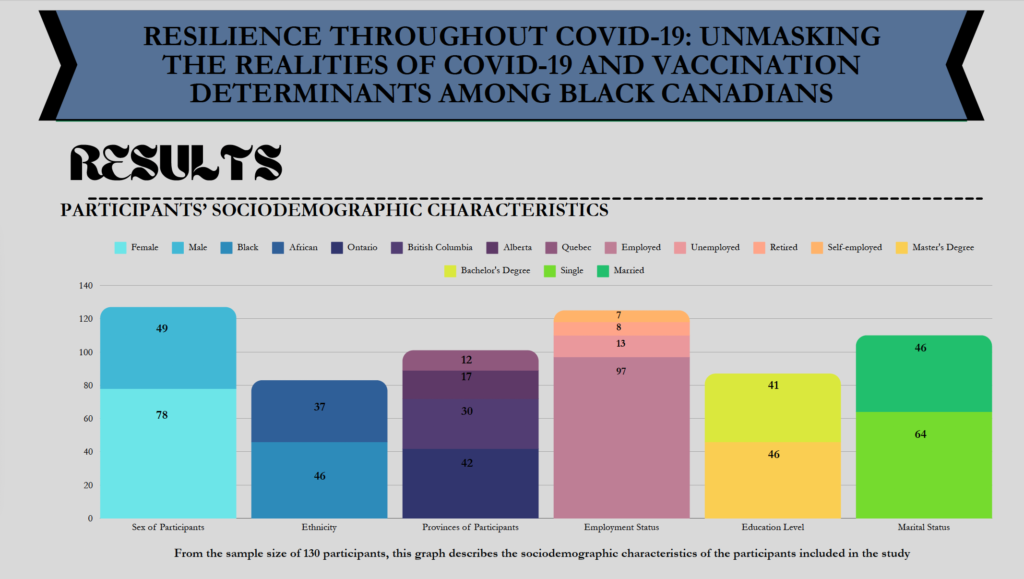Resilience Throughout COVID-19: Unmasking The Realities of Covid-19 And Vaccination Determinants Among Black Canadians
About the Resilience Throughout COVID-19 Project
This knowledge mobilization project aims to share and engage Black communities, policymakers, and other researchers around the results of a study the lab previously conducted on the health impact of COVID-19 among Black Communities in Canada. The findings of this study underscore the need for targeted interventions and tailored public health strategies to mitigate the disproportionate impact of the COVID-19 pandemic on Black communities in Canada and pave the way for equitable health outcomes and access to care.
The University of Toronto’s Social Sciences, Humanities, and Education Research Ethics Board (No. 41585) approved this study. Data were collected through semi-structured interviews and focus groups from November 18, 2021 until June 08, 2022 with participants who met the eligibility criteria.
Related Publications/Protocols: Examining the barriers, facilitators and attitudes towards COVID-19 vaccine and public health measures for black communities in Canada: a qualitative study protocol https://bmjopen.bmj.com/content/12/12/e063528
Funders: Public Health Agency of Canada, Western Research
Partners: Federation of Black Canadians
Participants’ Sociodemographic Characteristics

The individuals who participated in the study ranged in age from 20–89. From the sample size of 130, 34 participants (26.1%) were between ages 30 and 39. In addition, while 78 participants identified as female (60%), 49 (37.7%) identified as male. For this study’s purposes, we limited our scope of analysis to sex (female or male) rather than gender, which encompasses a wide range of expressions of identities beyond biological attributes. Regarding ethnicity, 46 participants identified as “Black” (35.4%), while 37 (28.5%) identified as “African.” Participants from all provinces were included, such as those who resided in Ontario (42, 32.3%), followed by British Columbia (30, 23.1%), Alberta (17, 13.1%), and Quebec (12, 9.2%). Furthermore, 97 (74.6%) reported being employed, 13 (10%) reported being unemployed, eight (6.2%) reported being retired, and seven (5.4%) were self-employed. Regarding highest education level, 46 participants had a master’s degree (35.4%), followed by a bachelor’s degree (41, 31.5%). Finally, 64 (49.2%) reported being single, and 46 (35.4%) reported being married
Experiences with COVID-19: Three Main Themes

Three prominent themes emerged in the experiences with COVID-19 topic. First, 27 participants described experiencing high severity of COVID-19 infection. Second, 25 participants mentioned experiences of stigma. Third, 18 participants cited long recovery, the third most prominent theme. Other themes related to experiences with COVID-19 included lacked emotional and physical support, which highlighted the experiences of six participants who did not receive emotional or physical support from family or friends while recovering from COVID-19. Regarding inadequate financial support, two participants reported that COVID-19 negatively impacted their financial status.
Experiences With Covid-19 Vaccines: Two Main Themes

In the experience with COVID-19 vaccine topic, two themes were prominent. Altogether, 45 participants mentioned factors related to inaccessibility and unavailability of vaccines. Furthermore, 28 participants cited lack of information and communication. Other notable themes included feeling coerced to get the vaccine, fear of nonvaccination consequences, and negative experiences with vaccine mandates.
COVID-19 Impact: Two main themes

Two main themes emerged in the topic, COVID-19 impact. As many as 97 participants expressed feelings of isolation, which described the situation of being physically separated from family, friends, or society due to the COVID-19 pandemic. The following theme, restricted mobility, described the limited ability to move physically from one location to another, and 63 participants cited it. This topic area also presented other themes. Work opportunity drew attention to positive and/or negative work-related outcomes impacted by the COVID-19 pandemic. Furthermore, challenges adjusting to remote school, work, and events described experiences utilizing technology to access several spaces during the COVID-19 pandemic. Concerns related to well-being and access to basic needs point to the importance of recognizing the concerns surrounding COVID-19 ideas and outcomes.
